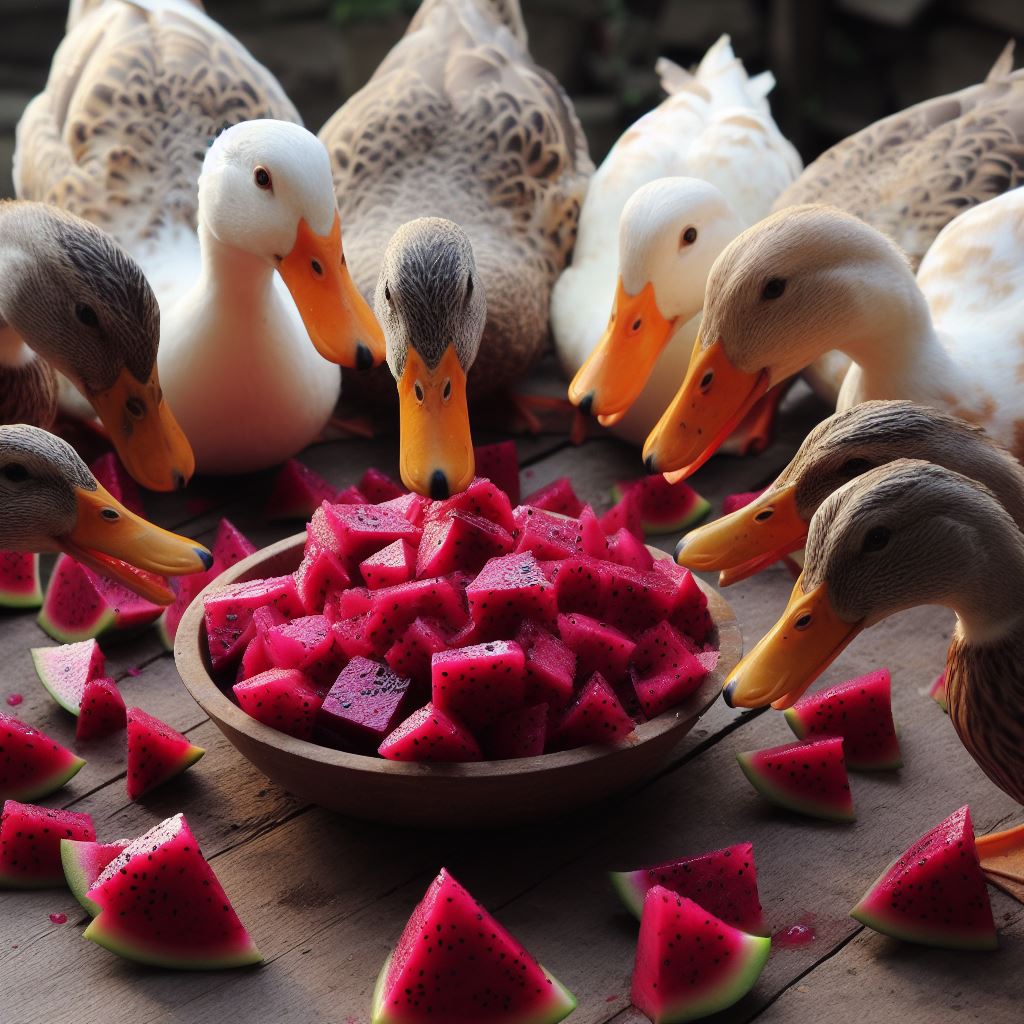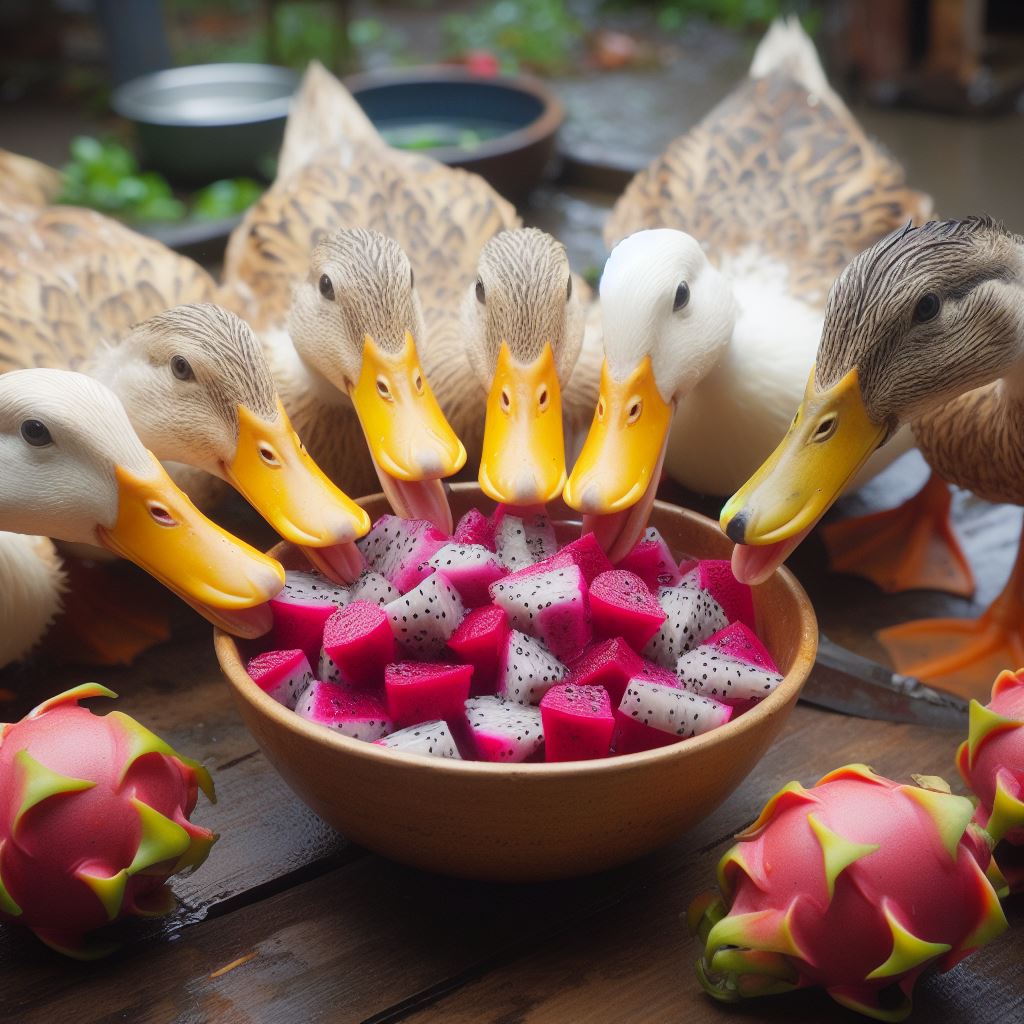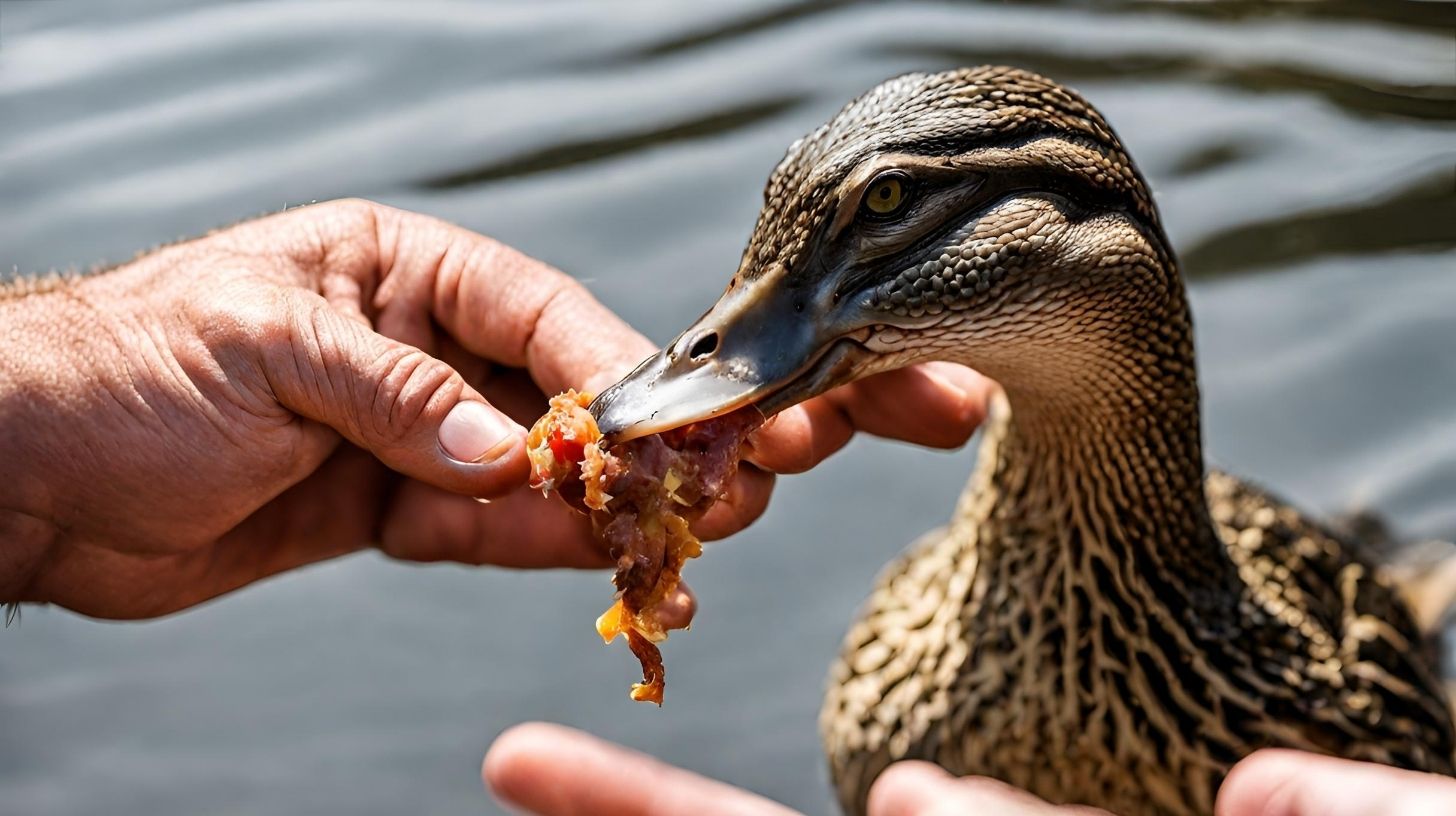Can Ducks Eat Dragon Fruit?

Table of content:
- Nutritional Composition of Dragon Fruit
- Benefits of Dragon Fruit for Ducks
- Considerations for Feeding Dragon Fruits to Ducks
- Other Fruits Suitable for Ducks
- Expert Opinions and Recommendations
- Common Misconceptions about Duck Diets
- Practical Tips For Introducing Dragon Fruit
- Observations and Anecdotes
- Conclusion
The question “Can ducks eat dragon fruit?” is an important one for any duck owner or farmer to understand. Dragon fruit, also known as pitaya or the strawberry pear, is an exotic and nutritious fruit that offers potential benefits for duck health and nutrition.
Yes, ducks can eat dragon fruit in moderation. Dragon fruit provides beneficial nutrients but excess sugar content poses digestive risks.
This article provides a comprehensive overview of dragon fruit’s nutritional composition, potential benefits, feeding considerations, expert opinions, common misconceptions, practical tips, and real-life observations regarding giving ducks dragon fruit.
The goal is to objectively examine if and how dragon fruit can be included as part of a balanced diet for domestic ducks.
Nutritional Composition of Dragon Fruit
Dragon fruit contains a range of essential vitamins and minerals that contribute to overall duck health:
| Nutrient | Benefits |
|---|---|
| Vitamin C | Boosts immune system, promotes growth & development |
| Iron | Helps carry oxygen in blood |
| Calcium | Needed for bone & egg health |
| B Vitamins | Important for energy metabolism |
Additionally, dragon fruit:
- Is high in dietary fiber for healthy digestion
- Has high water content to provide hydration
- Contains beneficial antioxidants
These nutrients make dragon fruit an excellent supplement to balance a duck’s diet.
 Benefits of Dragon Fruit for Ducks
Benefits of Dragon Fruit for Ducks
Feeding ducks dragon fruit offers two primary advantages:
1. Hydration
Ducks require access to water not just for swimming and preening, but also for meeting their internal hydration needs. The high moisture content in dragon fruit can contribute to this hydration requirement. This makes it beneficial for ducks during hot, dry weather conditions when dehydration may be a concern.
2. Nutrient Boost
The vitamin, mineral, and antioxidant content of dragon fruit gives ducks an added nutritional boost. In particular, iron aids respiratory and immune health, while calcium supports bone strength and egg development in breeding ducks.
Considerations for Feeding Dragon Fruits to Ducks
While nutritious, dragon fruits should comprise no more than 10% of a duck’s total food intake. Reasons for moderation include:
- Excessive consumption could lead to loose droppings
- High natural sugar content adds unnecessary calories
- Too much can inhibit appetite for a balanced main diet
Additionally, duck owners should:
- Remove inedible seeds and peel
- Cut dragon fruit into bite-size pieces for easier eating
- Introduce slowly in small servings
Monitoring reactions to this uncommon fruit can help determine appropriate portion sizes.
Other Fruits Suitable for Ducks
Alongside dragon fruit, ducks can safely enjoy small portions of:
- Melons – Honeydew, cantaloupe, watermelon
- Berries – Strawberries, blueberries, raspberries
- Apples
- Grapes – Seedless preferred
A diverse mix of fruits, vegetables, grains, protein sources, and grit should comprise the bulk of a duck’s balanced diet. Dragon fruit can provide a beneficial nutritional supplement in moderation.
Expert Opinions and Recommendations
Poultry nutritionists advise strict control over the amount of sugary fruits offered:
“Limit high-glycemic foods like fruit to no more than 10% of total feed. Monitor water intake and droppings when introducing new fruits.”
Additionally, reputable duck care resources suggest:
- Cutting dragon fruit and other fruits into bite-size pieces before feeding ducks
- Introducing new fruits slowly and in limited quantities
- Rinsing fruits to remove pesticides before feeding
Following expert guidance ensures dragon fruit can be fed safely.
Common Misconceptions about Duck Diets
Many inaccurate beliefs exist around feeding ducks, particularly regarding bread and household scraps. To clarify:
- Ducks should not eat bread, chips, pasta, or junk food
- Not all human food is safe for ducks
- Duck digestive systems differ from chickens
- Ducks require a specialized balanced diet
While ducks can digest a wider array of foods, limitations still exist. Exotic fruits may require gradual introduction and monitoring to avoid overconsumption or negative reactions.
Practical Tips For Introducing Dragon Fruit
Follow these tips for safely incorporating dragon fruit:
- Start slow – Begin with a few small pieces to gauge interest
- Mix it in – Combine with greens, sweet potato, berries
- Watch them eat – Monitor for reactions, favoritism, digestive issues
- Find their limit – Increase the portion gradually to determine appropriate daily amount
- Slice thinly – Cut into thin ovals to make bite-size
Adjust according to unique needs of your flock. Be conservative until ducks adjust.
Observations and Anecdotes
Many duck owners report success in offering small amounts of dragon fruit once or twice a week:
“When I first offered it, my ducks gobbled it up. Now I stick to about 1/4 cup max per duck spread out over the week.”
However, not all ducks take to new exotic fruits immediately:
“My ducks ignored the dragonfruit at first. But after seeing the wild ducks eat some, they tried it and loved it. Now they get excited when they see me cutting it up!”
As prey animals, ducks tend to be suspicious of new items. Positive reinforcement and close observation is key to transitioning ducks to favor dragon fruit.
Conclusion
In conclusion, dragon fruit’s high nutrient content provides vitamin, mineral, and antioxidant benefits that can positively supplement a duck’s diet. Their natural preference for sweet fruits makes dragon fruit an appealing addition.
However, moderation is crucial, as overconsumption poses risks for digestion and nutrition balance. By gradually introducing dragon fruit combined with close monitoring of each duck’s reactions, it can be a safe, nutritious addition to a varied diet.
Factor in no more than 10% of total food volume for the healthiest approach. Ultimately dragon fruit remains a healthy treat, but not a dietary staple, for backyard ducks.
Welcome. I’m Adreena Shanum, the proud owner of this website, and I am incredibly passionate about animals, especially poultry. I founded adreenapets.com as a labor of love, stemming from my desire to share my knowledge and experiences with poultry enthusiasts worldwide.




